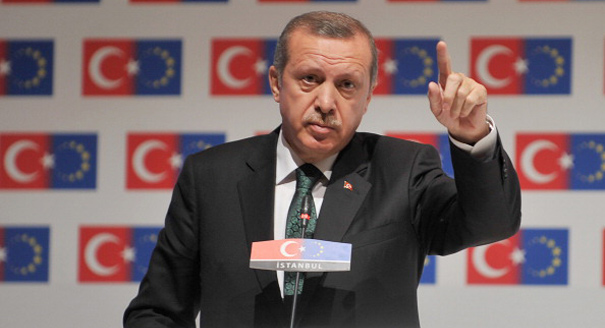On October 4–6, the Turkish president, Recep Tayyip Erdoğan, will be in Brussels for a long-planned visit to Belgium. The trip occurs in the midst of a major international crisis, as Russia is getting in on the act in Syria and asylum seekers continue to surge toward Europe. The visit also comes at a very troubled time in Turkey, where on November 1 a parliamentary election will be held amid a spiral of violence and a sharp deterioration of the rule of law.
This makes for a rather difficult agenda when President Erdoğan meets European Council President Donald Tusk, European Commission President Jean-Claude Juncker, and European Parliament President Martin Schulz in Brussels.
President Erdoğan will find EU leaders skeptical on two counts. On the one hand, it is obvious that demonizing all the Kurds of Turkey, threatening local Kurdish politicians and journalists, torching or ransacking the offices of the Kurdish-rooted Peoples’ Democratic Party (HDP) across the country, and disseminating hate speech are political tactics that run the risk of tearing Turkey’s social fabric apart.
This worries the EU and should worry the Turkish president too. Fighting terrorism is one thing; trying to kill off a democratically elected Kurdish-rooted party and muffling critical voices by all imaginable means is an entirely different proposition. In Brussels, President Erdoğan will find support for the first aim but none at all for the second. EU leaders will stress the need to return to dialogue with Turkey’s Kurds because a military solution is elusive and highly risky for the country’s future.
More generally, since 2013, a clampdown on the media, business, judges, and anybody critical of Turkey’s leadership has resulted in a dramatic deterioration of the country’s rule of law architecture. This brings to a halt the rapprochement of Turkey’s political framework with that of the EU.
On the other hand, it is now apparent that after two months of intensely fighting terrorism, Turkey has focused heavily on the PKK but has largely neglected to strike the self-proclaimed Islamic State.
President Erdoğan will be told that the EU has a simple expectation of Turkey in the field of counterterrorism: Ankara should seal off the remaining 80–100-kilometer (50–62-mile) stretch of the Turkish-Syrian border still controlled by the Islamic State, in compliance with Turkey’s participation in the international coalition against the militant group. For the Islamic State, this border is still the only gateway to the world, for ammunitions, jihadists, and smuggled oil exports. It is high time to put an end to this ambiguity.
President Erdoğan will also bring up his idea of a safe zone in this area and propose a last-minute round of consultations between the EU, the United States, and Turkey. Apart from its political motivation—namely, stopping the westward advance of the Syrian Kurds—the idea of a safe zone is eminently risky. Such a zone would invite strikes from the revamped air forces of Syrian President Bashar al-Assad or possibly even the Russian air force. The EU should not support this flawed proposal.
Another issue high on the agenda will be the refugee crisis. No doubt, the Turkish president will stress the generosity of his country in welcoming some 2 million Syrians, of whom 12–15 percent are in state-run camps. He will receive a proper applause for this effort, but if he complains about the EU’s stinginess, he might be reminded that in 2011 his administration refused EU assistance in forms other than blank checks.
This time around, following the September 23 European Council meeting, the EU will offer a larger package to Turkey—not in blank checks but via the UN refugee agency and the World Food Program, together with a request for genuine cooperation.
Dealing with the refugee crisis is no longer about parading one’s generosity or lack thereof, but about handling a number of critical issues in Turkey in a decisive manner. Among these issues is the shameful presence of human traffickers who roam freely around Turkey, pocketing hundreds of millions of dollars to send people on perilous journeys across the Mediterranean.
Another problem is the massive counterfeiting of Syrian passports in Turkey: Germany estimates that 30 percent of the Syrian passports checked by German authorities are forged. Further priorities include the need to screen migrants for refugee status on Turkish soil, which would allow for a safer onward journey, and the importance of coordination with Greece and Bulgaria on the transit of refugees.
Joint work is urgently needed, not just to keep refugees on Turkish soil, but also to restore some order and humanity in this disastrous crisis. There is no room left for Turkey to go it alone, as it elected to do from 2011 onward; it is time to share responsibilities. This is not about the EU versus Turkey, it’s about both playing a constructive role—together.
In a tense regional environment—with Russia taking military action in Syria, Iran assuming a stronger role in both Iraq and Syria, and Syrian consulates dishing out passports without many controls—the exodus of Syrian (and other) refugees to Europe via Turkey is posing extremely serious challenges for both the EU and Turkey.
In such a context, Ankara’s political, economic, and security anchor in Europe and the West matters more than ever. This calls for Turkey to assume a responsible attitude on both the domestic and the international scene.







.jpg)